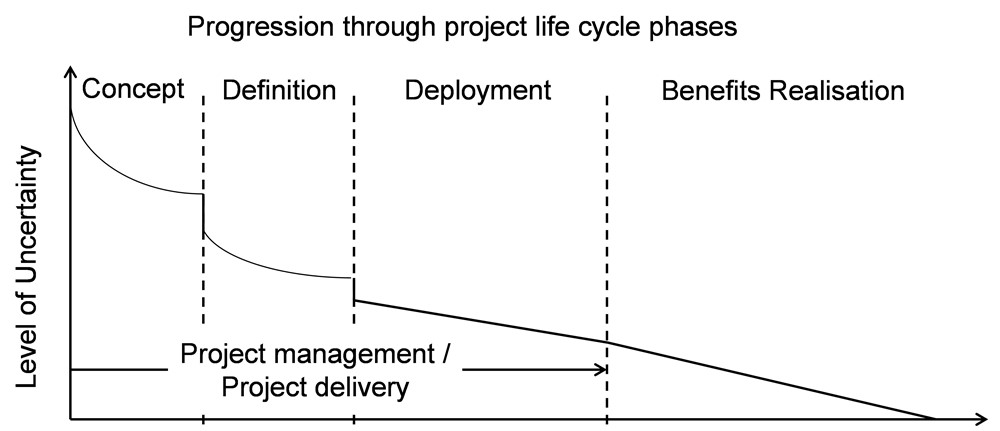A brief guide
Practical Project Risk Management
SERIES ARTICLE
By Martin Hopkinson
United Kingdom
Purpose
Understand the importance and means of managing risk during the earlier project phases.
Uncertainty usually is at its greatest at the start of a project
Risk can be understood as being caused by the implications of uncertainty. Usually, the overall level of uncertainly reduces as the project progress and is thus at its greatest at the outset. The figure below is based on a simplified project life cycle model and illustrates how the overall level of uncertainty associated with a project might evolve. Points to note include:

- The steps down in uncertainty between phases are associated with the narrowing down of scoping and planning options before authorising the project to proceed to the next phase.
- If risk-efficient choices have been made prior to the main delivery phase (deployment), risk exposure going forwards should be much lower than it was at project commencement.
- Having a high-risk management capability is thus important during the earlier phases.
- A project’s exposure to benefits realisation risk is usually higher than its exposure to project deployment risk: see the Risk to Project Benefits guidance sheet (October 2023).
- However, risk to benefits is also affected by project choices made during the early phases. This is another reason why risk management is important during those periods.
Despite these points, project risk management practice is often dominated by the use of tools and techniques such as Probability-Impact Matrices that are designed to manage risk during the deployment phase i.e. by which time there is a firmed-up plan. Despite being of potentially greater value from an overall project strategy perspective, tools and techniques that are better adapted to the early project phases tend to be less well-understood and less widely used.
More…
To read entire article, click here
Editor’s note: This series of articles is by Martin Hopkinson, author of the books “The Project Risk Maturity Model” and “Net Present Value and Risk Modelling for Projects” and contributing author for Association for Project Management (APM) guides such as Directing Change and Sponsoring Change. These articles are based on a set of short risk management guides previously available on his company website, now retired. For an Introduction and context for this series, click here. Learn more about Martin Hopkinson in his author profile below.
How to cite this paper: Hopkinson, M. (2024). Risk in the Earlier Project Phases: A brief guide, Practical Project Risk Management series, PM World Journal, Vol. XIII, Issue V, May. Available online at https://pmworldlibrary.net/wp-content/uploads/2024/05/pmwj141-May2024-Hopkinson-Risk-in-the-Earlier-Project-Phases.pdf
About the Author

Martin Hopkinson
United Kingdom
![]()
Martin Hopkinson, recently retired as the Director of Risk Management Capability Limited in the UK, and has 30 years’ experience as a project manager and project risk management consultant. His experience has been gained across a wide variety of industries and engineering disciplines and includes multibillion-pound projects and programmes. He was the lead author on Tools and Techniques for the Association for Project Management’s (APM) guide to risk management (The PRAM Guide) and led the group that produced the APM guide Prioritising Project Risks.
Martin’s first book, The Project Risk Maturity Model, concerns the risk management process. His contributions to Association for Project Management (APM) guides such as Directing Change and Sponsoring Change reflect his belief in the importance of project governance and business case development.
In his second book Net Present Value and Risk Modelling for Projects he brought these subjects together by showing how NPV and risk modelling techniques can be used to optimise projects and support project approval decisions. (To learn more about the book, click here.)
To view other works by Martin Hopkinson, visit his author showcase in the PM World Library at https://pmworldlibrary.net/authors/martin-hopkinson/









